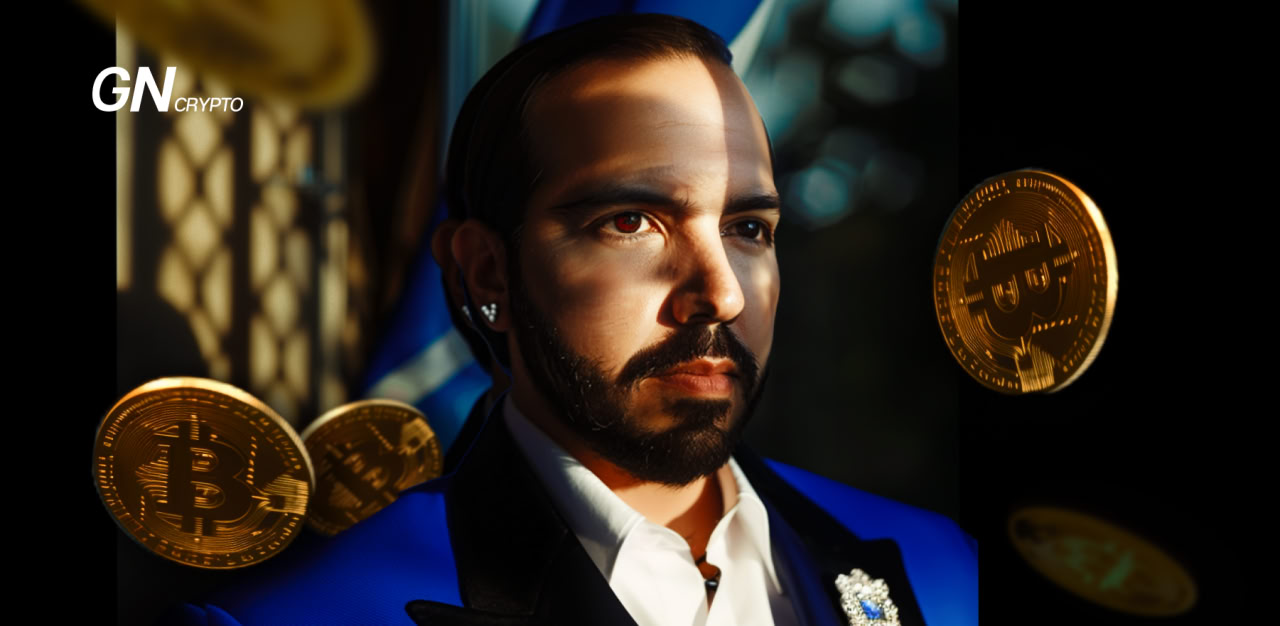Nayib Bukele: The Pro-Bitcoin President of El Salvador

No president in the world integrated Bitcoin into their policy as El Salvador’s Nayib Bukele did. In June 2021, he became the first, and so far the only, country leader to make Bitcoin a legal tender. Bukele’s decision was not a coincidence but a reflection of his broader approach to governance.
On this page
Nayib Bukele: The Most Popular President in Latin America
Nayib Bukele is the youngest president of El Salvador. He was first elected in 2019 at the age of 37 and re-elected in February 2024 by winning 83% of the votes. Bukele’s inauguration ceremony took place on June 1. Standing on the balcony of the National Palace with his wife, Gabriela, and two daughters, Layla and Aminah he greeted the supporters and took the presidential oath. The family expects the third child, who may have been born when you read this article.
Bukele pledged to fix the country’s economy, education, infrastructure, and other aspects after successfully reducing crime rates. According to the Salvadorian law, he will continue to lead for 5 more years.
The election results and different surveys show that the Salvadoran president has a high level of public support. According to CID Gallup, Bukele is the most popular president in Latin America based on the level of citizen approval in his management.
Bukele started his political career in 2012 as a mayor of Nuevo Cuscatlán, a small town in El Salvador. Since then, he has been known for urban infrastructure reforms, anti-corruption views, and active engagement with citizens through social media. In 2015, Bukele was elected as the mayor of the capital, San Salvador. Two years later he formed a party, called “Nuevas Ideas” (“New Ideas” in English). In 2019, Bukele participated in the presidential elections and won.
At the time, El Salvador was a highly dangerous country with gangs terrorizing people. For years, it had the highest homicide rates with security measures and arrests proving to be ineffective. The members of gangs found ways to reunite and continue their crimes.
To solve the problem, Nayib Bukele took harsh measures. In 2022, he announced an emergency state, after which armed forces patrolled the streets of the country. They were allowed to arrest and jail suspected criminals while suspending their right to a lawyer. According to official sources, more than 76,000 people were arrested during the mass actions.
Bukele’s declared war against the gangs had its results. In 2015 El Salvador faced 105 murders per 100,000 residents, after the crackdown, this figure dropped to 7.8 per 100,000. According to Statista, it now has the lowest homicide rate in Latin America. Citizens and visitors of El Salvador state that before, the fear of gangs made it impossible to walk around in the country, but now it feels more secure. A political commentator Joey Mannarino shared a video taken in downtown San Salvador at 9 pm, on X (formerly Twitter). He mentioned that the city was even more secure than many American and European cities.
Bitcoin as a Part of El Salvador’s Growth Strategy
El Salvador faces major economic challenges. Around 70% of the country’s population doesn’t have a bank account. Salvadorans heavily rely on money transfers sent by migrants. According to the World Bank, around 26% of the GDP (Gross Domestic Product) comes from remittances. High international transaction costs make the country dependent on the global economy, particularly on the US, where most of the migrants work. At the same time, El Salvador’s national currency is the US dollar, which means dependence on the US monetary policy and lack of control.
Nayib Bukele adopted Bitcoin as a potential solution to the described challenges. In 2021, he announced making Bitcoin a legal tender to increase El Salvador’s economic freedom, financial inclusion, and economic growth. Nayib Bukele wrote on X that Bitcoin’s use in the country would increase the GDP, and reduce remittance costs, which would improve the lives of millions. Now, while the US dollar remains the primary currency for official purposes and economic standards, El Salvador allows conversion and use of Bitcoin through an automatic system, as explained by PwC. The automatic conversion system allows businesses to instantly convert any Bitcoin payments to U.S. dollars reducing their exposure to Bitcoin's price fluctuations. The government also launched a digital wallet app, called Chivo, to allow citizens to manage their Bitcoins easily. In less than 3 weeks, Chivo was actively used by 2.1 million Salvadorans.
Bukele's Bitcoin strategy also includes investing in cryptocurrency for the national treasury. In November 2022 El Salvador started “The 1 Bitcoin a day” program, which suggests buying one Bitcoin every day until it becomes unaffordable with fiat currencies. In March 2024, Bukele said the country had stored over $400 million in Bitcoin in an offline cold wallet.
That’s not all. In 2023, El Salvador’s congress approved a citizenship program, based on which foreigners can gain Salvadoran citizenship in return for $1M in investments in Bitcoin or USDT, a stablecoin pegged to the US dollar. The initiative, named the “Adopting El Salvador Freedom Visa Program,” is limited to 1,000 participants a year, who can receive a Salvadoran passport with their spouse and children under the age of 18.
Bukele's Bitcoin strategy is often criticized by the mainstream media due to its risks related to Bitcoin's volatility. Especially when the price of Bitcoin falls, there are numerous articles saying that El Salvador's Bitcoin bet isn't paying off. Bukele’s response to critics is that price fluctuations don’t affect the country’s long-term strategy. He stated that reporting only the country’s losses while remaining silent about profits is not professional journalism.
A Dictator or a Hero? Depends on Who You Ask
Despite high approval ratings, Nayib Bukele’s governance methods have been met with concerns and labeled as dictatorial. Amnesty International, a human rights organization, says the criminal crackdown is being conducted in violation of human rights.
According to the organization, thousands of people are being detained without any evidence of committing a crime. The state of emergency and large-scale arrests were followed by protests of people demanding justice for their relatives. Over 7,000 people have been released from prison in the past year due to lack of evidence, since the state of emergency started.
Now, El Salvador has the highest incarceration rate in the world. In response to criticism about overcrowded prisons, Bukele mentions that the solution to the world’s highest murder rate is putting the murderers in jail.
Bukele’s bold decisions, as well as his party’s majority in the Congress, are the reasons why some media outlets call him a dictator. On his social media profile, Bukele calls himself the “Philosopher King,” a title that succeeds “World’s Coolest Dictator” as a response to criticism.
Given the public support and reforms in the country, Nayib Bukele is trusted by the majority of Salvadorans, even as international observers remain divided on his governance style. In the next 5 years, the pro-Bitcoin president and his decisions are expected to maintain global interest.
The content on The Coinomist is for informational purposes only and should not be interpreted as financial advice. While we strive to provide accurate and up-to-date information, we do not guarantee the accuracy, completeness, or reliability of any content. Neither we accept liability for any errors or omissions in the information provided or for any financial losses incurred as a result of relying on this information. Actions based on this content are at your own risk. Always do your own research and consult a professional. See our Terms, Privacy Policy, and Disclaimers for more details.

























